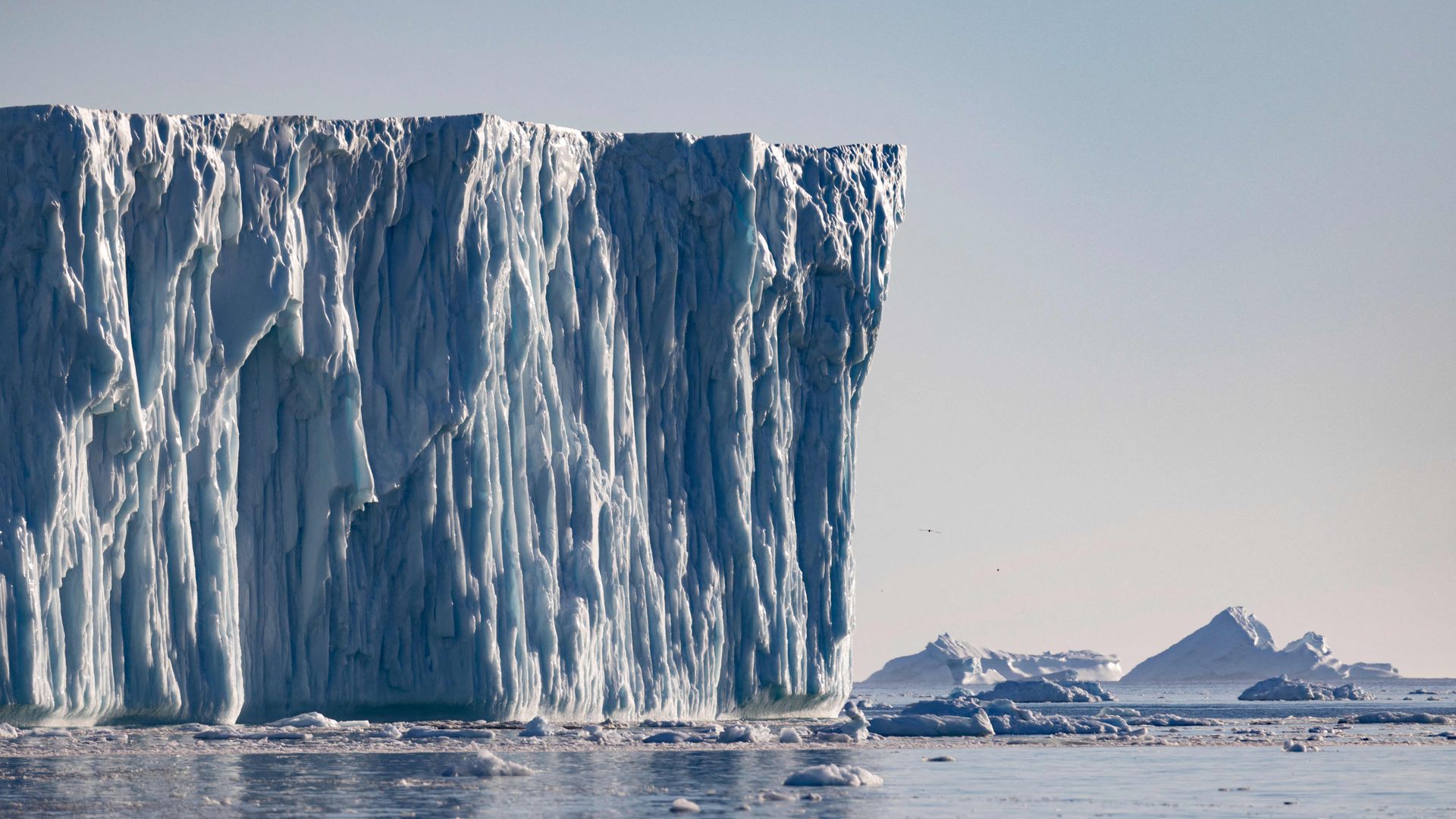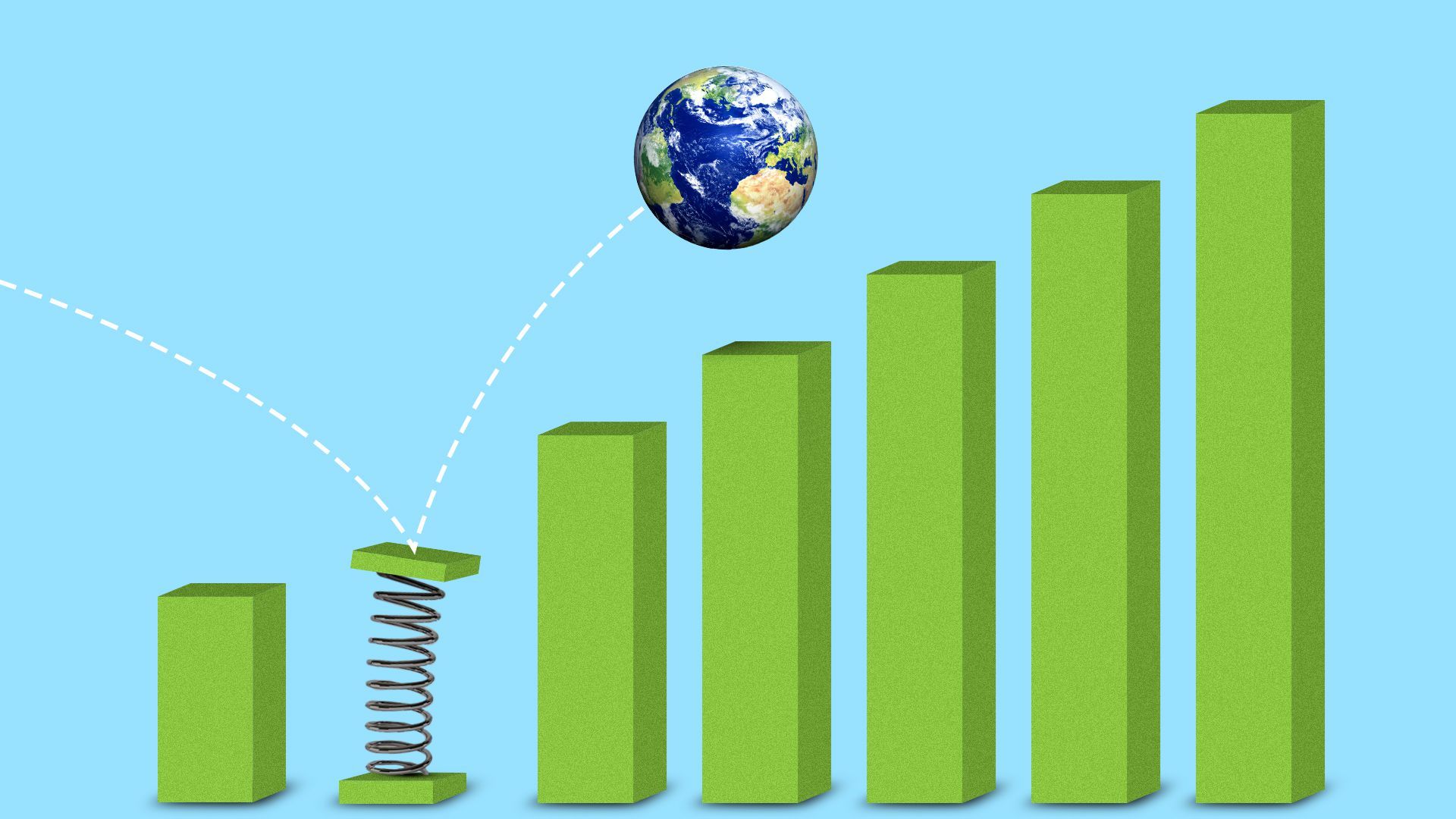| | | | | | | | | | | Axios Generate | | By Ben Geman and Andrew Freedman · Aug 30, 2022 | | 🚀 Let's do this! Today's newsletter, edited by Carlos Cunha, has a Smart Brevity count of 1,260 words, 5 minutes. 🚨 The UN secretary general appealed for aid for flood-ravaged Pakistan this morning, calling the rains a "monsoon on steroids." Reuters has more 🎶 At this moment in 2010, Eminem and Rihanna were atop the Billboard Hot 100 with today's intro tune... | | | | | | 1 big thing: Greenland's unavoidable impact on sea levels |  | | | An iceberg floats in Disko Bay, Ilulissat, Greenland, on June 30. Photo: Odd Andersen/AFP via Getty Images | | | | Greenland is on course to raise global sea levels by at least 10.6 inches during the next century, even if human-caused warming were to cease immediately, a new study finds, Andrew writes. The big picture: The study combines satellite and in-situ measurements during the past 20 years of the retreating snow line around the edge of the ice sheet with knowledge of how the ice sheet will adjust over time to such changes. - The result is an alternate estimate of the minimum amount of Greenland-related sea level rise to which global warming has already committed us, compared to other research that relies on ice sheet models.
Why it matters: The study constitutes a clear warning to coastal residents that already worsening flood events could increase significantly in both frequency and severity in coming decades. Threat level: The research finds that the main contributors of Greenland ice melt to the sea will come from loss of surface mass, via precipitation and meltwater run-off during the summer melt season, and other processes. - The loss of coastal ice shelves will contribute to about half of the sea level rise commitment, the researchers found.
- About 3.3% of the ice sheet's total mass is likely to be lost without any further warming, according to lead author Jason Box of the Geological Survey of Denmark and Greenland.
Yes, but: Researchers told Axios the findings are conservative, both due to quirks in its methods and to the assumption that no further global warming will take place, which will almost certainly not play out in real life. - The study also contains a warning: If Greenland's recent high melt years, such as 2012 and 2019, become more common, the minimum sea level rise would be far higher, at about 2.6 feet.
- The timing of any committed increase, said Eric Steig of the University of Washington, who was not involved in the new research, is uncertain and will make a big difference in society's ability to adapt.
What they're saying: "Even if we could shut off climate change today, the ice will inevitably reach that equilibrium it needs to repair the damage already done by climate change," study coauthor David Bahr of the University of Colorado at Boulder said via email. - The conclusions, Bahr said, show that we have to act fast to cut greenhouse gas emissions from fossil fuel burning.
- "If we want to avoid even higher sea level rise of two or more feet from Greenland alone, then we need the world's governments to act quickly. We need to get to net-zero [emissions] as fast as possible," he said.
|     | | | | | | 2. First look: Unlocking climate science |  | | | Illustration: Sarah Grillo/Axios | | | | A new multi-million dollar initiative aims to unlock access to climate and biodiversity research that's now trapped behind expensive paywalls, Andrew exclusively reports. Driving the news: The nonprofit knowledge sharing group Creative Commons is launching the four-year Open Climate Campaign. - Research on climate-related threats to species worldwide is too often siloed away in countries or requires costly subscriptions, said Catherine Stihler, Creative Commons' CEO.
Why it matters: Biodiversity hot spots such as the Amazon rainforest are under increasing stress from climate change and human-caused deforestation. - "Knowledge about climate data and biodiversity is exceedingly important, and it must be immediately and freely open to all," Stihler told Axios in an interview.
Between the lines: The campaign plans to work with governments, research funders and environmental groups to create open access policies. - Creative Commons also aims to help publishers transition existing paywalled climate and biodiversity research publications into open-access journals.
- The initiative includes two other nonprofits that work to free up information, SPARC and EIFL.
Zoom in: The program has a $4 million grant from the Arcadia Fund, an environmental fund set up by historian and philanthropist Lisbet Rausing and her husband, Peter Baldwin, along with $450,000 from the Open Society Foundations. |     | | | | | | 3. Rethinking the zeal for EV range |  Data: Energy.gov; Chart: Axios Visuals More and more long-range electric cars are hitting the market, but a NYT op-ed that's worthy of your time argues that so much emphasis on powerful batteries is misplaced, Ben writes. The big picture: "Rather than unleashing a mass market of affordable E.V.s, more than a decade of subsidies favoring large batteries has created an overheated market for premium E.V.s," writes Edward Niedermeyer, an electric car expert and the author of a 2019 book about Tesla. - "A serious electrification policy will have to be tailored to the way we actually drive, not the way we think we do."
Zoom in: He notes the average American motorist drives 40 miles daily and 95% of trips are 30 miles or less. - "In an era of battery scarcity, we could have two 150-mile E.V.s for the battery capacity in every 300-mile E.V."
- "Or, using the same 300-mile E.V. battery, you could have six plug-in hybrids with 50 miles of electric range for daily driving and a gasoline engine for those rarer road trips or many, many more e-bikes."
Keep reading |     | | | | | | A message from Axios | | The biggest Axios Pro sale all year | | |  | | | | Take $300 off Axios Pro and see how smarter, faster news and analysis can transform your decision making. Be smart: This is our biggest discount of the year, so don't miss out. Offer ends September 6th. Use code LABORDAY at checkout to get $300 off your subscription. | | | | | | 4. Why Europe's energy upheaval won't end soon |  | | | Illustration: Aïda Amer/Axios | | | | Europe may face years of energy market tumult beyond the near-term economic crises arising from Russia's invasion of Ukraine, Ben writes. Driving the news: With gas and power prices recently hitting records, European Commission president Ursula von der Leyen said yesterday a fundamental rethink of the bloc's market is underway. - Shell CEO Ben van Beurden told reporters in Norway there may be "a number of winters" of energy rationing to compensate for reduced Russian gas supplies.
- Belgium's energy minister is warning that the next 5-10 winters could be "terrible" without a cap on natural gas prices, an idea multiple European officials are floating.
Why it matters: The break with Russia — the EU's top energy supplier — is bringing short- and long-term dislocations. - The Kremlin may further restrict gas flows this winter, while EU officials are vowing a multi-year effort to end use of Russian oil, gas and coal this decade.
- It's a mix of diversifying suppliers and speeding expansion of renewables, conservation, hydrogen and more.
What we're watching: Specifics of the immediate and wider plans that Von der Leyen previewed. - The existing market "was developed under completely different circumstances and for completely different purposes," she said yesterday.
- The commission is working on both an "emergency intervention" and "structural reform," Von der Leyen said in a speech.
- "We will have to develop an instrument, that will happen in the next days and weeks, which ensures that the gas price will no longer dominate the electricity price," she said in a separate appearance in Berlin, Bloomberg reports.
|     | | | | | | 5. A window into climate groups' messaging |  | | | Illustration: Aïda Amer/Axios | | | | A new poll helps explain why green groups' ad campaigns are emphasizing potential consumer savings from the climate law, Ben writes. Driving the news: The CBS News/YouGov survey finds that 46% of likely voters consider climate "very important" to their midterm election decisions. - Climate is way behind the economy (81%), inflation (76%) and several other topics in the poll out Sunday — a hierarchy that tracks with other polls.
The big picture: Environmentalists' ads, like this via EDF Action, focus heavily on claims of lower costs. - Recent joint ads from Climate Power, the League of Conservation Voters and Future Forward USA Action hit similar notes.
Yes, but: Two other ads by that trio are devoted to extreme weather. |     | | | | | | 6. Bonus exclusive: A new $12 ad million buy |  | | | Illustration: Allie Carl/Axios | | | | Climate Power Action and League of Conservation Voters Victory Fund on Tuesday are launching a $12 million digital ad and direct mail campaign aimed largely at younger, college-educated women, Axios' Alexi McCammond exclusively reports. What they're saying: Heather Hargreaves, senior adviser for Climate Power Action, said their modeling in coordination with Blue Labs, a Democratic data science company, showed messaging around lower energy costs, job creation, clean energy and consequences of failing to take climate action is most effective with their target demo. Read the whole story |     | | | | | | A message from Axios | | The biggest Axios Pro sale all year | | |  | | | | Take $300 off Axios Pro and see how smarter, faster news and analysis can transform your decision making. Be smart: This is our biggest discount of the year, so don't miss out. Offer ends September 6th. Use code LABORDAY at checkout to get $300 off your subscription. | | | | 📬 Did a friend send you this newsletter? Welcome, please sign up. Thanks for reading and we'll see you back here tomorrow. |  | | Why stop here? Let's go Pro. | | | | | | Axios thanks our partners for supporting our newsletters. If you're interested in advertising, learn more here.
Sponsorship has no influence on editorial content. Axios, 3100 Clarendon Blvd, Arlington VA 22201 | | | You received this email because you signed up for newsletters from Axios.
Change your preferences or unsubscribe here. | | | Was this email forwarded to you?
Sign up now to get Axios in your inbox. | | | | Follow Axios on social media:    | | | | | |
No comments:
Post a Comment